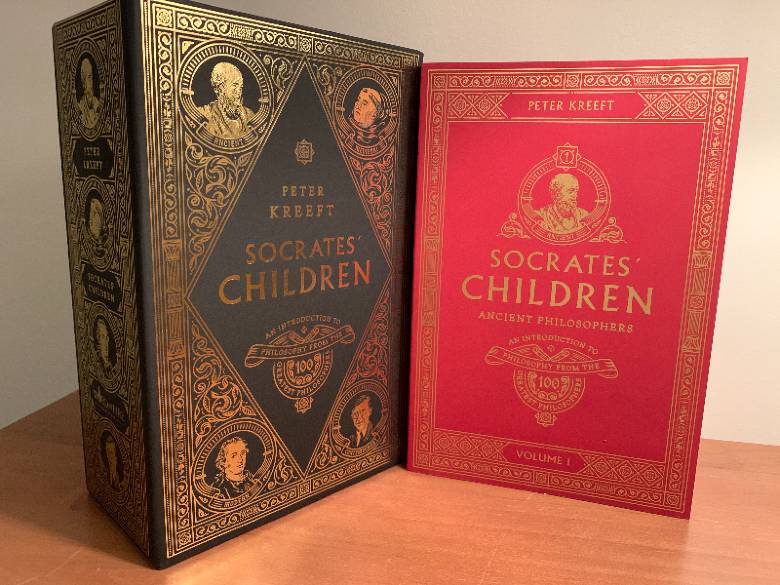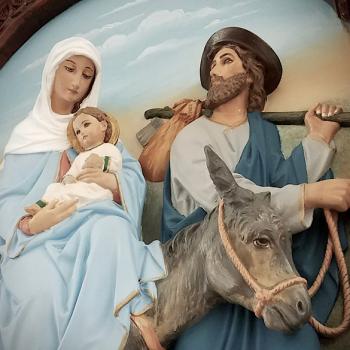
Growing up, I never learned about Buddha, Buddhism, or the daily life of Buddhists beyond basic knowledge and seeing the occasional statue in a gift shop. One high school class on “India and Southeast Asia” covered the topic for a week or so, but I have never had a desire to truly investigate Eastern philosophies outside of basic awareness. I don’t think I shied away from Buddha out of fear of being swayed. Rather, I didn’t feel a need for Buddha. I had Jesus. But what if it’s not strictly Buddha versus Jesus.
Comparing Buddha versus Jesus
In Peter Kreeft’s first volume of Socrates’ Children, there is a brief overview of Buddha beginning with the fact that Buddha is not a name. Gotama would be the name, and Buddha would be the title. Gotama was called Buddha, meaning “awakened”, the way Jesus is called “Christ”, or “annointed”.
Four Truths
After an introduction to the person, Kreeft also lays out Buddha’s Four Nobel Truths:
- To live is to suffer
- Suffering is caused by desire
- The way to end suffering, is to end desire
- To remove desire, follow the Nobel Eightfold Path
Compare these four truths, Buddha vs. Jesus. Jesus’ truths have a similar structure:
- The symptom is Death
- Death is caused by sin
- The way to end death, is to have Eternal Life
- Eternal Life is possible by divine grace
- (Romans 6:23)
The structure here is similar in logic, but the biggest difference I see is the ending. Look at the two fourth truths: follow the eightfold path vs. divine grace. Buddha’s plan relies on our action, following the path. Sure, it also takes our participation to be open to God’s divine grace, but in the end we are reliant on God to do the heavy lifting.
“Following the Path” sounds similar to “Pick up your cross and follow me.” Yet, the key difference is that there is a person and relationship involved in the latter – “the Path” vs. “Me”.
The Path
That Buddhist fourth truth states to follow an Eightfold path. What is this Eightfold path? It is striving to be “right” in understanding, thought, speech, action, livelihood, effort, mindfulness, and concentration.
My first thought is that these almost sound like something out of the sermon on the mount! But what would Jesus say? Jesus tells us the greatest commandment: to love God with all your heart, soul, and mind. Then secondly, to love your neighbor as yourself.
Jesus replied: “‘Love the Lord your God with all your heart and with all your soul and with all your mind.’ This is the first and greatest commandment. And the second is like it: ‘Love your neighbor as yourself.’ Matthew 22:37-39
Will “right” in understanding, thought, speech, action, livelihood, effort, mindfulness, and concentration help us to love God and neighbor? I would say that they can, but only if we have the proper understanding of “right”.
In a secular or relativistic culture with many definitions of “right”, one could be led in any direction. However, rooted in the Tradition and teachings of the Church, we can learn what is “right” and pursue that life.
The Goal
I’d like to look back to our “4 truths”. The stated goal of the Buddhist philosophy is to end suffering. The goal of Christianity is rather different, to end death.
For comparison, it’s stated in a similar format as the Buddhist, “to end death“. Yet, I would argue it is more so about the positive, “to gain eternal life” which is actually possible through suffering and death.
Jesus even tells us in the Beatitudes “Blessed are those who are persecuted for righteousness’ sake, for theirs is the kingdom of heaven.” (Matthew 5:10), or “If any want to become my followers, let them deny themselves and take up their cross and follow me.” (Matthew 16:24).
Suffering for the Christian, is not the disease. Christians embrace suffering as a way of uniting our lived experience with Jesus. We “carry our cross” and even appreciate it as a means of growing closer in relationship with God who gives the divine grace.
Not “What” is the Goal, but “Who”?
The end goal is the major difference for Buddha versus Jesus. Buddha did not claim to be God or have a God. Instead he told of nirvana, a state of no more desires. Thus, no more suffering. For Jesus, he preached of a Kingdom, and a relationship with God in the Father, Son, and Holy Spirit.
Learning From Buddha to Know Jesus
I think in the end, we can learn from Buddha. We can use some of his insights, while remaining rooted in the Church, to grow closer to our end goal, Jesus.
Coincidentally, my brother recently gifted me a copy of The Mindful Catholic by Dr. Gregory Bottaro with a forward by Peter Kreeft. In the forward, Kreeft says “By the way, this is not a Buddhist book. It is a Christian and Catholic book. It does not lead you into nothingness or emptiness but into everything – especially into God.”
I am very aware that my brain is all over the place. So I look forward to diving into this book and learning what I can from this practice with the peace of being rooted in Catholic Tradition! Stay tuned for how that goes.
Read more Formed by a Flame or Subscribe to the Newsletter!













